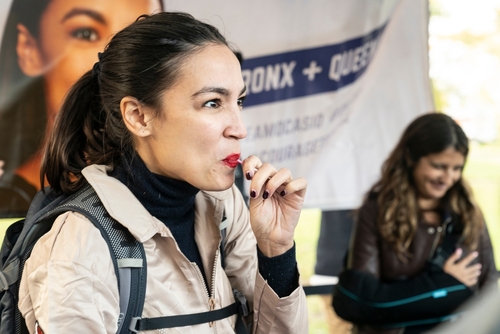In a nation marked by political division, Alexandria Ocasio-Cortez’s recent call for resistance against Donald Trump’s 2024 election victory has ignited controversy and debate. Is this productive? Trump won a resounding victory.
A Call to Arms Raises Alarm
Congresswoman Alexandria Ocasio-Cortez shared her concerns about a future under Donald Trump’s leadership through social media, where she warned of a potential shift towards authoritarianism. The statement drew immediate reactions, with critics arguing that her rhetoric bears the potential to incite unrest similar to historical European resistance movements. Her juxtaposition of today’s situation with past anti-fascist struggles underscores the gravity with which she views the present moment.
Ocasio-Cortez’s concerns stretch beyond rhetoric; she discussed tangible threats such as a possible federal abortion ban and deportations. She called for unity among Democrats to combat these anticipated policy shifts, arguing for public education on government functions and preparing communities. Many see this call for unity as essential in an increasingly fractured political landscape.
NEW: AOC finally has her expected meltdown:
Stunning
“We are about to enter a political period that will have consequences for the rest of our lives.”
Yes, AOC, that’s why we voted for Trump. To keep your commie friends out of the White House. Maga pic.twitter.com/ddYjXn1TTs
— Cash Loren (@CashLorenShow) November 7, 2024
Balancing Caution and Unrest
Ocasio-Cortez emphasized, “Our main project is to unite the working class in this country against a fascist agenda, period.” Her comments target a perceived ‘fascist agenda’ under Trump’s new term, tying in historical movements of people rallying against authoritarian regimes. Such parallels, while powerful, draw criticism for potentially endorsing violent actions. Skeptics argue her narrative could further escalate the nation’s deep-seated political divides.
Despite assurances from Trump’s side that such drastic shifts would not occur, Ocasio-Cortez’s words serve as a warning for her supporters to stay vigilant. Her appeal for a unified Democratic front against divisive sectarianism also highlights intraparty dynamics, occasionally marred by finger-pointing and power struggles. Ocasio-Cortez’s urging for unity and community building could be vital in this politically charged era.
.@AOC used to be working class, but she’s forgotten where she came from. Now she thinks @realDonaldTrump is going to throw her in prison, like she has some sort of persecution fantasy. That’s because on the left, being a victim gives you status. pic.twitter.com/MeHqNRDyhc
— Jesse Watters (@JesseBWatters) November 8, 2024
Personal Motivations and Political Strategy
Ocasio-Cortez’s remarks follow a pattern of drawing on personal and community struggles, explaining her motivations to advocate for working-class families. This narrative resonates with many who feel marginalized by recent political developments. As she navigates the complexities of her party and the broader political environment, her calls for preparation and resistance reflect an immediate need for action in the eyes of her supporters.
The discourse following Ocasio-Cortez’s comments highlights the tension between advocating for democratic principles and avoiding potentially harmful rhetoric. Her comparison to historical anti-fascist movements, while drawing attention to pressing issues, must be considered carefully within the current political climate to prevent inflaming divisions further.


A know NOTHING barmaid – telling educated experienced people how to run this country – give me a break – deport this Fool to where she came from